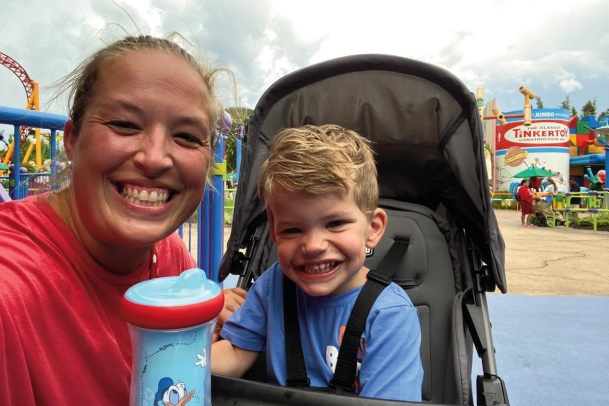DELAYS FOR AUTISM DIAGNOSIS AND TREATMENT GREW EVEN LONGER DURING THE PANDEMIC
BY ANDY MILLER AND JENNY GOLD
Wylie James Prescott, 3, had to wait more than a year after his autism diagnosis to begin behavioral therapy, even though research shows early treatment of autism can be crucial for children's long-term development.
His mother, Brandie Kurtz, said his therapy wasn't approved through Georgia's Medicaid program until recently, despite her continued requests. "I know insurance, so it's even more frustrating," said Kurtz, who works in a doctor's office near her home in rural Wrens, Georgia.
Those frustrations are all too familiar to parents who have a child with autism, a complex lifelong disorder. And the pandemic has exacerbated the already difficult process of getting services.
This comes as public awareness of autism and research on it have grown and insurance coverage for treatment is more widespread. In February, Texas became the last state to cover a widely used autism therapy through Medicaid. And all states now have laws requiring private health plans to cover the therapy, applied behavior analysis.
Yet children from Georgia to California often wait months — and in many cases more than a year – to get a diagnosis and then receive specialized treatment services. Therapies that can cost $40,000 or more a year are especially out of reach for families who don’t have insurance or have high-deductible health plans. Children from minority communities and those who live in rural areas may face additional barriers to getting help.
"You would never allow a kid with cancer to experience these waits," said Dr. Kristin Sohl, a pediatrician at University of Missouri Health Care and chair of the American Academy of Pediatrics' Council on Children With Disabilities Autism Subcommittee.
During the early months of the covid-19 pandemic, many families canceled in-home services, fearing infection. Virtual therapy often didn't seem to work, especially for nonverbal and younger children. With fewer clients, some providers laid off staff or shut down entirely.
And treatment services always face high turnover rates among the low-wage workers who do direct, in-home care for autism. But covid made the staffing problem worse. Companies now struggle to compete with rising wages in other sectors.
The Centers for Disease Control and Prevention estimates that autism affects 1 in 44 U.S. children, a higher prevalence rate than ever before. Autism symptoms can include communication difficulties and repetitive behaviors and can be accompanied by a range of developmental and psychiatric health conditions.
Early diagnosis of autism can make a difference, Sohl said. Symptoms of some kids who begin their therapy by age 2 or 3 can be greatly reduced.
Diagnoses are typically done by developmental-behavioral pediatricians, psychologists, psychiatrists, and neurologists, all of whom are in short supply. The shortage of developmental pediatricians is especially acute. Even though they do three more years of fellowship training than a general pediatrician does, developmental pediatricians typically earn less.
typically earn less. General pediatricians with training can also do assessments, but insurers often require a specialist's diagnosis before paying for services, creating a bottleneck for families.

THE HARDEST PART: Brandie Kurtz of Wrens, Georgia, said her son Wylie James Prescott had to wait more than a year after his autism diagnosis to begin behavioral therapy, even though research shows early treatment of autism can be crucial for children's long-term development.
“If we solely rely on specialists, we’re setting ourselves up for failure because there aren’t enough of us. We need the insurance companies on board,” said Dr. Sharief Taraman, a pediatric neurologist and president of the Orange County, California, chapter of the American Academy of Pediatrics.
Even in a metro area, getting a child an appointment can take months. "We cannot get these families in fast enough," said Dr. Alan Weintraub, a developmental pediatrician in suburban Atlanta. "It's heartbreaking."
Some parents pay cash for an evaluation with a private specialist, worsening disparities between kids whose parents can afford to skip the wait and those whose parents cannot.
Once a child has been diagnosed, many face an equal – or longer – wait to get autism therapies, including applied behavior analysis, a process that aims to improve social, communication, and learning skills. These sessions can take more than 20 hours a week and last more than a year. ABA techniques have some critics, but the